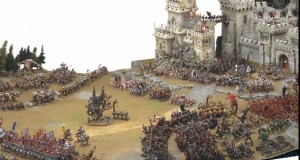As the PCs become more powerful and earn a reputation they’re going to become better known across the land. However, there are going to be times when this fame and notoriety will actually be a hindrance. So when one of those situations arises why not throw a skill challenge into the background of the story in order to remind the PCs that if they want to keep their identities a secret it’s going to require a little bit of work.
I want to stress that this kind of skill challenge should be going on in the background and not be a full-on skill challenge in the traditional sense. By the time the PCs have earned enough experience to be recognized, a skill challenge to hide their true identities will seem beneath their level. When I say recognized, I mean to the extent that they can no longer walk among the common folk without drawing crowds and onlookers.
However, by making this a skill challenge with real consequences and XP, the players will realize that it needs to be taken seriously. It also gives the players additional motivation to really get into the role-playing.
